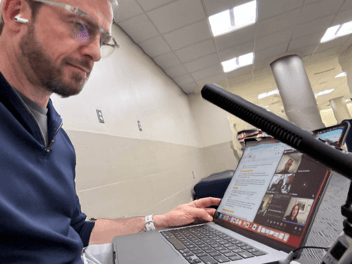Apprenticeship 2.0 | Higher Education and Apprenticeships with Jamie Merisotis of Lumina Foundation
In our June 27th episode of the Reach University Podcast, Apprenticeship 2.0, President Joe E. Ross had a wide-ranging discussion with Jamie Merisotis, President and CEO of Lumina Foundation about the evolving landscape of higher education and the role of apprenticeships in meeting America's growing talent demands.
Crisis in higher education
Higher education in the United States is in crisis in three areas: Affordability, the unmet demand for talent and a system not designed for purpose, according to Merisotis.
For most Americans, college is simply unaffordable. Tuition has outpaced inflation every year for decades. That has resulted in almost $2 trillion in outstanding student loan debt. And this has led to growing skepticism among parents and students about the value of a college degree and declining enrollment. In fact, colleges are closing at an alarming rate.
Despite these challenges, Merisotis pointed to research that shows most adults still believe higher education boosts income, fosters innovation, and enhances quality of life. We see consistently that half of working adults wish they had more degree education than they do. Likewise educational attainment as a percentage of population continues to grow. In the last 15 years the percentage of college graduates has grown to 54% from 38%.
Nonetheless, many critical jobs that require degrees go unfilled. Merisotis, and others, worry about growing demands for talent that AI and other technological advances will inspire. Merisotis has long written and spoken out about the growing demand for talent in the US and how we will meet it. He advocates for systemic change that focuses on delivering value for employers instead of simply creating graduates with credentials.
Delivering value
A major challenge area Merisotis sees is the need for a system that not only provides access to education but also delivers real value. Merisotis argues that the current model is outdated, rooted in post-World War II policies designed to increase access rather than ensure outcomes. Today, the focus must shift to how education can meet the increasing demand for talent in the workforce. This includes preparing individuals not just for jobs but for active participation in democracy, balanced lives, and overall well-being.
Apprenticeships hold promise
One of the most promising solutions discussed was the rise of registered apprenticeships, especially in traditionally degree-focused fields like teaching and healthcare. These apprenticeships, supported by the Department of Labor (DoL), represent a merging of educational and workforce development policies. Merisotis praised countries including Germany and the UK for their comprehensive apprenticeship systems that span multiple industries and are supported by employer levies. He argues that the US could integrate apprenticeships more broadly across sectors to create more pathways for learning and career advancement.
The Department of Talent
Merisotis also proposed a radical restructuring of government education and training systems in order to foster a focus on talent development. He has long advocated for the creation of a US Department of Talent, which would consolidate functions from the Department of Education (DoE), the DoL, and other agencies. This department would be responsible for the development and deployment of talent, ensuring a cohesive approach to education and workforce readiness. His thinking is evolving to include a state-based approach as implementation at the federal level may be too challenging. Some states, including Indiana, are already beginning to integrate these functions.
Competency-based education
While Merisotis sees room for improvement in our accreditation systems for higher ed, he says we can refine the current system rather than starting anew. New innovative models, such as Reach University, would not gain traction without that seal of approval, Ross pointed out. Instead, systemic change should move us from simply granting degrees to ensuring graduates have the competency to do the job they are credentialed to do. Competency-based education means students are assessed on their ability to demonstrate specific skills and knowledge rather than on time spent in the classroom. However, he noted that this model has yet to be scaled to its full potential.
The workplace as classroom
One place where innovation that leads to systemic change is happening today is at the intersection of traditional liberal arts education and workplace-based learning, such as in the Apprenticeship Degree. Ross and Merisotis discussed the concept of "credit for work," where workplace learning is recognized alongside rigorous academic coursework. Merisotis argues that liberal arts education, with its focus on critical thinking, problem-solving, and communication, is more relevant than ever in a world increasingly dominated by technology. As artificial intelligence and automation reshape the workforce, human qualities such as compassion, ethics, and well-being will become even more critical.
In summary, the conversation highlighted the urgent need for higher education to adapt to the changing demands of society and the workforce. Through innovative approaches such as apprenticeship degrees, competency-based education, and a more integrated government approach to talent development, there is hope for a system that not only provides access but also delivers meaningful value to individuals and society as a whole.
Listen to the full episode on Apple Podcasts, Spotify, or wherever you listen to your podcast episodes. Below and above you'll find highlights from President Ross' conversation with Jamie.
.png?width=352&name=Reach%20Blog%20Hero%20Image%20(1).png)

